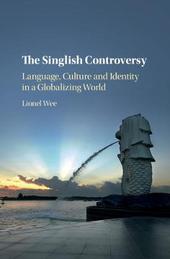
|
The Singlish Controversy: Language, Culture and Identity in a Globalizing World
Hardback
Main Details
| Title |
The Singlish Controversy: Language, Culture and Identity in a Globalizing World
|
| Authors and Contributors |
By (author) Lionel Wee
|
| Physical Properties |
| Format:Hardback | | Pages:220 | | Dimensions(mm): Height 235,Width 235 |
|
| Category/Genre | Language - history and general works
linguistics |
|---|
| ISBN/Barcode |
9781107181717
|
| Classifications | Dewey:945.506 |
|---|
| Audience | | Professional & Vocational | |
|---|
| Illustrations |
Worked examples or Exercises; 3 Tables, black and white; 3 Halftones, black and white
|
|
Publishing Details |
| Publisher |
Cambridge University Press
|
| Imprint |
Cambridge University Press
|
| Publication Date |
25 January 2018 |
| Publication Country |
United Kingdom
|
Description
Singlish is the colloquial variety of English spoken in Singapore. It has sparked much public debate, but so far the complex question of what Singlish really is and what it means to its speakers has remained obscured. This important work explores some of the socio-political controversies surrounding Singlish, such as the political ideologies inherent in Singlish discourse, the implications of being restricted to Singlish for those speakers without access to standard English, the complex relationship between Singlish and migration, and the question of whether Singlish is an asset or a liability to Singaporeans. These questions surrounding Singlish illustrate many current issues in language, culture and identity in an age of rapid change. The book will be of interest to scholars and advanced students of World Englishes and sociolinguistics. Its detailed analysis of the Singlish controversy will illuminate broader questions about language, identity and globalization.
Author Biography
Lionel Wee is a professor in the National University of Singapore's Department of English Language and Literature. He has written extensively about New Englishes and language policy, particularly in relation to the Singapore context. He served for a number of years on the Singapore Government's Speak Good English Movement.
Reviews'Wee's book, which combines theoretical discussions with relevant examples, is ... a welcome reality check for language researchers, educators, and policy makers to reassess their claims and positions beyond narrow linguistic descriptions, evaluative discourse, and linguistics prejudices.' Stefanie Pillai, Language in Society
|